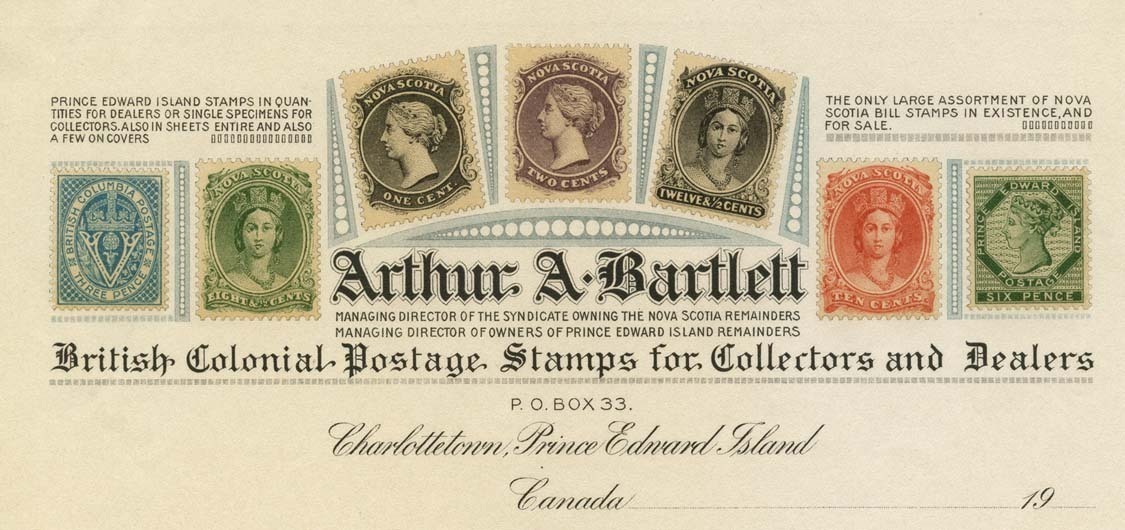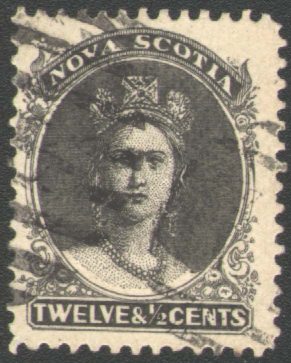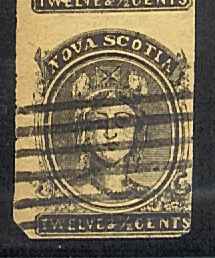 |
|||||
|
|||||
| Preview of Stamps Catalogue: VOLUME 1 |
 |
|||||
|
|||||
| Preview of Stamps Catalogue: VOLUME 1 |
Return To Catalogue - Nova Scotia 1851 issues - Canada
Note: on my website many of the
pictures can not be seen! They are of course present in the catalogue;
contact me if you want to purchase it.
For issues of Nova Scotia of 1851 click here.
1 Cent black 2 Cents lilac 5 Cents blue
For the specialist: these stamps are perforated 12.
Value of the stamps |
|||
vc = very common c = common * = not so common ** = uncommon |
*** = very uncommon R = rare RR = very rare RRR = extremely rare |
||
| Value | Unused | Used | Remarks |
| 1 c | * | * | Exists bisected |
| 2 c | * | ** | Issued 1862 |
| 5 c | *** | ** | Exists bisected |

Proofs, some with diagonal 'SPECIMEN' overprint (not to be
confused with the common forgeries with curved 'SPECIMEN'
overprint)

Some other imperforate proofs.
Some mailboat cancels 'A91', 'A92', 'A93', 'A94', 'A95', 'A97', 'A98' and 'B61' exist (the cancel 'A96' does not seem to exist). Other cancels consist of an ellipse with horizontal lines; sometimes with letters in the center, for example 'H' for 'Halifax'.
Fournier forgeries:
ATTENTION; THESE STAMPS WITH
CURVED "SPECIMEN" OVERPRINTS ARE FORGERIES:
These 'specimen' forgeries were sold by the
forger Fournier. They have wrong perforation gauge (10 1/2). I've
been told that the "SPECIMEN" overprint has also been
removed from these forgeries (but I've never seen such forgeries
myself). Fournier offers them for 1 Swiss Francs (the 3 values
together with the 3 values of the next series) in his 1914
pricelist. I recently obtained information that these forgeries
could have been made by the Senf brothers
and that they were only sold by Fournier.
By the way, there exists also some rare straight
"SPECIMEN" overprints (probably proofs, I've only seen
them imperforate).
Spiro forgeries:
Other forgeries (note the strange New South Wales cancel, that has never been used in Nova Scotia! and the ugly perforation):





The above forgeries were made by the Spiro brothers. An easy way to identify them is the cancels, they bear a New South Wales cancel that was never used in Nova Scotia. Also note that sometimes guidelines can be seen in the corners of the stamp. It is described as the second forgery in Album Weeds. The front of the neck is too close to the white circle. There is a solid line at the outline of the nose and forehead.
Oneglia forgeries:
Oneglia (or Panelli?) also made two types of forgeries of these stamps; engraved and lithographed ones.


(Oneglia lithograped forgeries?)
I think the above stamps are Oneglia lithographed forgeries, the cancels are dotted patterns. Note the white eyes.


Oneglia engraved forgery of the 5 c
value, image obtained thanks to Richard Frajola; the chin is more
pronounced and the 'N' of 'NOVA' is slanting. Next to it a 2 c
Oneglia forgery (also engraved).
The engraved forgery is also described in Album Weeds as the first forgery; the perforation is 10 (instead of 12), there is an outline around the shaded circle, the base of the neck is cut of by this circle, the two apples above 'SC' are different, etc. The 1 c has the inscription 'ONE CENTS' instead of 'ONE CENT.'. Often, these forgeries are found on pieces of old paper.
Other forgeries:

(Image obtained thanks to Richard Frajola)

This forgery has a smaller 'S' in 'CENTS', I've only seen it with
this number cancel '119' (only a part of it is visible here).
Image obtained thanks to Richard Frajola.

Another imperforate forgery with guidelines around the stamp.
There are other forgeries made from a so-called Bartlett letterhead:

Barlett letterhead, reduced size


Bartlett forgeries, reduced sizes
Bartlett used this letterhead to promote his remainders that he had acquired in 1896. The 'Bartlett' forgeries were cut out from the above letterhead and perforated by other forgers. The perforation was originally indicated with a thin black line, which can in most cases still be seen in the forgeries. Since Bartlett didn't have any 5 c remainders, no 5 c Bartlett forgeries exist.
For forgeries of bisected stamps, see after the next series.
8 1/2 Cents green 10 Cents red 12 1/2 Cents black
For the specialist: these stamps have perforation 12.
Value of the stamps |
|||
vc = very common c = common * = not so common ** = uncommon |
*** = very uncommon R = rare RR = very rare RRR = extremely rare |
||
| Value | Unused | Used | Remarks |
| 8 1/2 c | * | *** | |
| 10 c | *** | *** | Exists bisected |
| 12 1/2 c | *** | *** | |
The most common forgeries are Spiro and Fournier forgeries.
Fournier forgeries:
ATTENTION; THESE STAMPS WITH CURVED 'SPECIMEN' OVERPRINTS ARE FORGERIES:
These 'specimen' forgeries were sold by the
forger Fournier. They have wrong perforation gauge (10 1/2
instead of 12). I've been told they also exist with the
'SPECIMEN' overprint removed. I recently obtained information
that these forgeries could have been made by the Senf brothers and that they were only sold by
Fournier.
By the way, there exists also some rare straight 'SPECIMEN'
overprints (probably proofs, I've only seen them imperforate).
Spiro brothers forgeries:
The above forgeries were made by the Spiro brothers. An easy way to identify them are often the cancels, they bear a New South Wales cancel that was never used in Nova Scotia. I've also seen these forgeries with a '905' numeral cancel.
Oneglia (or Panelli?) also made forgeries of these stamps.



(Oneglia forgeries?, images obtained thanks to Richard Frajola)
I've been told that the Oneglia forgeries are perforated 13 3/4 to 14, while the genuine stamps are perforated 12. The above stamps have the same perforation as the genuine ones. Frajola's website show the above stamps and presumes them to be Oneglia forgeries (?). The above forgeries have a white band at the bottom of the ellipse (neck of the Queen), this white band does not exist in the genuine stamps. It is described in Album Weeds as the third forgery.
Other forgeries:



(An early German forgery, left image obtained thanks to Richard
Frajola)
The inscriptions in the above forgery are different from the genuine stamps.


Deceptive engraved forgery (left) and genuine stamp (right) of
the 8 1/2 c value. The lettering is slightly different, the
shading is also different and the eyes are more staring in the
forgery.
There are other forgeries made from a so-called Bartlett letterhead.

Barlett letterhead, reduced size

Bartlett forgeries, reduced size
Bartlett used this letterhead to promote his remainders that he had acquired in 1896. The 'Bartlett' forgeries were cut out from the above letterhead and perforated by other forgers. The perforation was originally indicated with a thin black line, which can in most cases still be seen in the forgeries.
There exist many forgeries of bisected stamps of Nova Scotia (mostly genuine stamps on genuine letters). The most famous forger to produce bisected stamps on cover is Raoul de Thuin (see for examples: 'The Yucatan Affair, the work of Raoul de Thuin, philatelic counterfeiter' by the American Philatelic Society or 'Nova Scotia Fakes and Forgeries' by R.B.Mitchell), but others seem to have been active in this area.

(Forged bisected stamp on letter; the stamp that was used is
genuine)




Some forged De Thuin covers with bisected stamps, all with a
forged 'HALIFAX NOVA SCOTIA' cancel. The cancel is not really
circular, also in the genuine cancel, there is a dot between
'NOVA' and 'SCOTIA' according to the Yucatan Affair book. The
last cover shows a cover with a forged 'PAID' cancel that also
appears in the Yucatan Affair book.

Bill Stamp of Canada with 'N.S.' overprint, reduced size
The following values exist: 1 c brown, 2 c red, 3 c green, 4 c brown, 5 c red, 6 c green, 7 c red, 8 c brown, 9 c green, 10 c blue, 20 c blue, 30 c blue, 40 c blue, 50 c blue, $1 blue and black, $2 red and black and $3 green and black.
'Nova Scotia Fakes & Forgeries' by Captain R.B.Mitchell, R.D. Published by: Scotia Stamp Studio, 1723 Barrington St. Halifax, N.S. (1976)
'The Postage Stamps of New Brunswick and Nova Scotia' by Nicholas Argenti (I haven't read this book myself).
A list of forgeries of Nova Scotia can be found at http://www.rfrajola.com/nosforgeryindex.htm (website of Richard Frajola); I have used some of his pictures on this page.